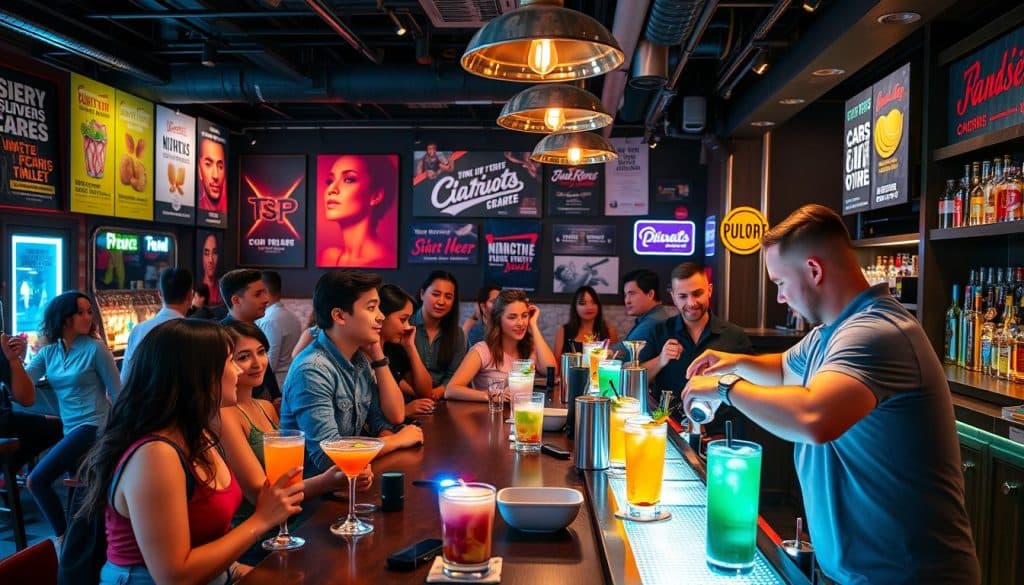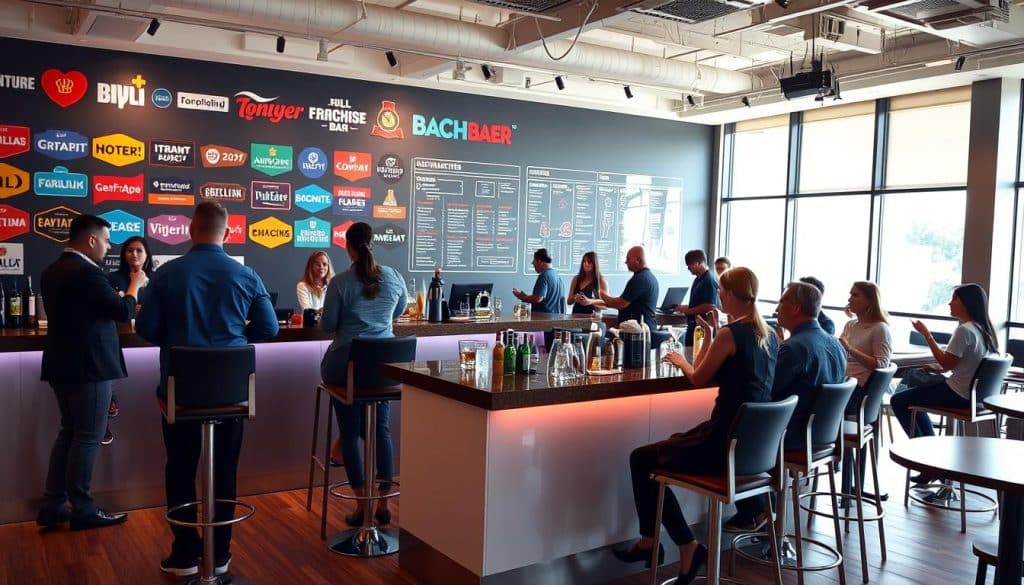Have you ever wondered why the bar industry is booming? It’s making more money than many traditional businesses. With almost $37 billion in annual revenue and a 3% growth rate, franchise bars are a great chance for new entrepreneurs.
These bars use well-known brands and tested business plans. They meet changing customer tastes. From late-night diners to craft beer lovers, there’s a bar for everyone.
Entrepreneurs are drawn to the lively vibe and popular items like craft beers and tasty grill food. The shift in what people want to eat and drink shows the bar industry’s bright future. Let’s explore the exciting world of franchise bars in the US and why they’re a smart choice.
Key Takeaways
- The US bar industry generates nearly $37 billion in annual revenue.
- Franchise bars benefit from established brand recognition and support.
- There are affordable franchise opportunities, including sports bars and brewpubs.
- Understanding location visibility is key in picking the right spot for a franchise bar.
- The trend towards artisanal craft beers is opening up new franchise opportunities.
- Franchise bars can meet the needs of late-night diners and special occasions.
What is a Franchise Bar?
A franchise bar is a special kind of bar in the hospitality world. It works under a certain brand and follows set rules. These bars get the benefit of the brand’s good name, proven ways to do business, and help from the franchisor. This setup draws many entrepreneurs to the bar business, as it lowers risks and boosts success chances.
Definition and Concept
The main draw of a franchise bar is its set business plan. It lets people run their bars with the help of a well-known brand. This setup gives new owners tools to face bar challenges, like marketing and day-to-day help. Franchise bars often get customers faster and build loyalty quicker than standalone bars.
History of Franchise Bars
The franchise idea started to grow in the 20th century. It led to many franchise bars popping up in the U.S. This model let entrepreneurs use existing customer demand, creating bars that fit local tastes. As tastes changed, franchise bars updated, keeping their high standards.
Key Differences Between Bars and Franchise Bars
It’s important to know the differences between bars and franchise bars for those thinking of starting one. Franchise bars get support from the franchisor, like marketing plans and training. Compared to independent bars, franchise bars follow set ways of doing things. This leads to better efficiency and customer happiness. It also helps franchisees feel part of a community.
Benefits of Owning a Franchise Bar
Owning a franchise bar has many benefits that can help you succeed. One big advantage is getting brand recognition right away. This means you don’t have to start from scratch to attract customers.
Franchise bars come with a ready-made customer base. This lets you focus on providing great service instead of building a brand. It’s a big plus for new business owners.
Brand Recognition
Brand recognition is key in the franchise world. It makes customers trust and come back more often. Franchises also get marketing help, keeping their brand top of mind for customers.
Proven Business Model
The franchise business model lowers the risk of starting a new business. Franchise bars offer systems and support to help you succeed. This means you can start your bar faster and grow your business sooner.
Access to Training and Support
Franchise bar training is a big deal. It includes programs that teach you how to run a bar well. These can last from a few days to months, giving you the skills you need.
Franchisors also offer ongoing support. This helps you stay ahead in the fast-paced bar industry. You get the tools to meet customer needs and handle challenges.
Popular Franchise Bar Brands in the US
Franchise bars offer a wide range of choices for those starting a business. Many popular brands are growing across the US, drawing in investors and customers. Famous names like Buffalo Wild Wings and Hooters are known for tasty food and lively places. They serve millions each year, thanks to their strong brands.
Famous Franchise Bar Chains
Some top franchise bars are well-known everywhere. Buffalo Wild Wings, started in 1991, has 533 units. It costs between $2,443,000 and $4,830,000 to start, making it a big but rewarding chance. Hooters, a leader in franchise bars, has 101 units and costs $2,748,000 to $4,100,000 to begin. These big names offer great support and rely on loyal customers.
Regional Franchise Bar Options
There are also regional favorites like Beef O’Brady’s Family Sports Pub and The Greene Turtle. Beef O’Brady’s, started in 1985, has 144 units and costs $806,825 to $1,288,350 to start. The Greene Turtle, founded in 2003, has 31 units and costs $1,455,000 to begin. These local spots become beloved, serving up what the community loves.
Emerging Franchise Bar Brands
New brands are coming up with fresh ideas and special offers. Walk-On’s Bistreaux & Bar, franchising in 2015, has 74 units. It costs $1,555,000 to $7,056,000 to start. These new franchises reach different audiences, adding variety for those looking to own a bar.
Key Considerations for Franchise Bar Ownership
Owning a franchise bar comes with its own set of challenges and opportunities. Before starting, you need to think about a few key things. These include the cost to start, finding the right location, and following the rules.
Initial Investment Costs
Starting a franchise bar costs a lot of money, usually between $200,000 to $300,000. This money goes towards licensing, buying equipment, and stocking up. The type of bar you choose can affect how much you need to invest. It’s also important to pick good suppliers for things like POS systems and furniture.
Location and Market Demand
The right location is key for a franchise bar’s success. A good spot means more people will see and visit your bar, which helps your profits. You should study the market and other businesses around to make sure you have a good spot. Think about the size and how easy it is to get to when choosing a location.
Regulatory Requirements
Following the rules is a big part of owning a franchise bar. You need to meet health codes, get liquor licenses, and follow zoning laws. Knowing these rules early helps avoid problems later. Getting all the necessary permits and licenses is important for running your bar smoothly.
Financial Insights into Franchise Bars
Knowing the financial side of franchise bars is key for both current and future owners. Getting the right financial insights can lead to smart choices. These choices can greatly affect a bar’s success in a tough market. The money a franchise bar makes can change a lot based on where it’s located, its reputation, and how well it’s run.
Average Revenue of Franchise Bars
Franchise bars can make a lot of money. Many make an average yearly income that shows the bigger trends in the bar and hospitality world. Things like how much people want to go there, how well it’s run, and how loyal customers are play big roles. Some bars, thanks to their famous brands, can even make more than others in the industry.
Expected Profit Margins
Franchise bars can have good profit margins if they’re managed well. Places that do well can make between 10% and 20% profit. Things like what they sell, how much they pay employees, and how efficient they are can change these numbers. Keeping customers happy and controlling costs are key to making the most money.
Financing Options
There are many ways to finance a franchise bar. You can get loans, help from the franchisor, or even government grants for small businesses. Many franchisors also offer financial help and support to new owners. Knowing all your options can help you start your franchise on the right foot.
Marketing Strategies for Franchise Bars
Marketing is key for franchise bars to attract and keep customers. Strong branding makes experiences memorable, building loyalty. It also makes the bar stand out to new customers.
Importance of Branding
A clear brand sets a franchise bar apart from others. Using the same logos, colors, and messages makes it easy to recognize. This builds trust and helps attract more customers.
Utilizing Social Media Platforms
Social media is vital in today’s world. Platforms like Instagram and Facebook help bars share exciting content. This can include events, deals, and daily specials, engaging both current and new customers.
Community Engagement
Getting involved in local events boosts a franchise bar’s image. Hosting events, sponsoring activities, or teaming up with other businesses makes the bar a community hub. This helps it become a go-to spot, encouraging people to come back.

Challenges in Operating a Franchise Bar
Running a franchise bar comes with its own set of hurdles, mainly in the competitive world of hospitality. To stand out, owners must be creative and quick to adapt to market changes. Overcoming these obstacles is key to keeping customers and staying profitable.
Competition in the Hospitality Sector
The hospitality world is fiercely competitive. Franchise bars need to find ways to stand out to keep customers coming back. A solid marketing plan, highlighting unique features, is critical. Owners must always check their market position and respond to rivals smartly.
Staffing and Training Issues
Staffing can be a big challenge for franchise bars. Finding skilled staff is vital for good customer service. Without the right people, wait times can rise, hurting customer loyalty. Regular training and communication with the franchisor can help, ensuring staff meets brand standards.
Adapting to Market Changes
Franchise bars need to be agile and adapt to market shifts, like changes in what customers want or the economy. Staying on top of trends, like healthy drinks, can attract more customers. Owners can use franchisor support to make quick changes and stay ahead.
Trends Influencing Franchise Bars
The world of franchise bars is changing fast. Owners need to keep up with these changes to stay ahead. This helps them meet the needs of their customers.
Rise of Craft and Specialty Beverages
Craft beverages are becoming more popular. People want unique and top-notch drinks. Bars are now serving craft cocktails, local beers, and special wines.
This shift helps bars attract a more refined crowd. They get to offer real, unique experiences.
Health and Wellness Trends
Health is now a big deal in bars. Customers want healthier food and drinks. This has led to more plant-based and low-calorie options.
Bars that offer these choices are seen as caring about their customers’ health. This makes them stand out in the industry.
Sustainability Practices
Sustainability is key for bars now. They’re using organic and local ingredients. They also choose eco-friendly packaging and try to reduce waste.
As people care more about the environment, bars that focus on sustainability win their customers’ trust. This boosts their reputation in a crowded market. For more on these trends, check out this link on trends influencing franchise bars.
Franchise Bar Training and Support
Training and support are key for franchise bars to succeed. New owners get the knowledge and skills they need. This helps them manage their business well.
Initial Training Programs
Training programs give new owners a strong start. They learn about managing the bar, serving customers, and marketing. The training includes online lessons, workshops, and hands-on practice.
Ongoing Support and Resources
Support doesn’t stop after training. Franchisors provide ongoing help. This includes marketing tools, operational guides, and coaching sessions.
This support helps owners face challenges and keep up with market changes.
Importance of Networking
Networking is vital for franchise owners. It lets them share ideas and experiences. This builds relationships and helps businesses grow.
Events, conferences, and online forums are great for connecting. They offer a chance to learn from others.

Locating the Right Franchise Bar
Finding the right franchise bar needs a detailed approach. You should look into market trends, possible locations, and what different brands offer. It’s also key to understand the local people and what they like.
Researching Franchise Opportunities
Good research means checking things like how many people live nearby and how much money they make. For example, Twin Peaks likes places with lots of people and a lot of traffic. Knowing these details helps find the best spots. You can also use help from trusted franchise agencies to navigate the market.
Franchise Disclosure Document (FDD)
The Franchise Disclosure Document (FDD) is very important. It tells you about costs, what you have to do, and the franchisor’s history. Reading it well helps you know what you’re getting into. It also shows how well other franchises have done, which can help predict success.
Visiting Existing Franchise Locations
Seeing how a franchise works in person is very helpful. You can see how it runs and talk to customers. Talking to current owners gives you a real view of what it’s like to own a franchise. This can really help you decide if a franchise is right for you.
Success Stories of Franchise Bar Owners
Franchise bar owners share their success stories, showing the rewards of this dynamic sector. Barrio Burrito Bar is a great example, aiming to open nearly 100 stores in the U.S. by 2028. They focus on secondary markets and suburbs, which works well for them.
They offer diverse menus and keep costs low, standing out in the market. Their growth plan includes a strong operations team. This team provides detailed training and support, ensuring quality everywhere.
Case Study: A Profitable Franchise Bar
Sarah Lookingbill, a Shuckin’ Shack franchise owner, has seen great success. She moved from corporate training to owning her own bar seven years ago. She’s faced challenges like hurricanes and the COVID-19 pandemic.
Her dedication to the community has built a loyal customer base. Events have grown from 20 to 100 attendees, showing her impact.
Overcoming Challenges in the Business
Franchise bar owners face unique challenges. Sarah’s experience with severe weather and the pandemic shows the need for resilience. Managing these challenges requires being adaptable and having a strong support system.
She credits corporate help in marketing, social media, and product sourcing. This support was key in overcoming hurdles.
Lessons Learned from Successful Owners
Franchise owners’ journeys offer valuable lessons for new entrepreneurs. Community involvement and quality training are key to success. Stories from Barrio Burrito Bar and Shuckin’ Shack show how to thrive in the franchise bar world.
Adapting to changes and focusing on quality are essential for growth and success. These lessons can help others in the franchise bar industry.
The Future of Franchise Bars in the US
The future of franchise bars in the US looks bright. Consumers are looking for new and unique drink experiences. This demand is driving the growth of franchise bars, creating a lively market.
Entrepreneurs are bringing fresh ideas to the table. This is opening up new chances for both new and seasoned owners.
Projected Growth of Franchise Bars
Experts say the franchise bar sector will keep growing. Companies like Rosso Pomodoro and Pups Pub have big plans. They aim to open many new locations in the next few years.
This shows the market is strong. It’s a good time for both new and established brands to grow.
The Impact of Technology on Operations
Technology is changing how franchise bars work. Owners are using new tools to improve service and customer experience. This includes online booking and mobile payments.
These changes make things more efficient and pleasurable for customers. As the industry grows, staying tech-savvy is key.
Opportunities for Innovation and Expansion
The franchise bar market is full of chances for new ideas. Bars with unique themes or customizable drinks are drawing in more people. For example, Tapster offers a special experience with an average check of $22.
As the market changes, owners need to stay flexible. They must keep their offerings fresh to meet new trends and keep growing.





